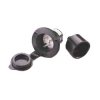surfinjoe
New Member
So I am going a different route. I am looking to add an onboard charger that hooks to shore power. Is it as simple as adding the charger, hooking it to a shore power plug, and connecting to shore?
Any thoughts would be greatly appreciated!
Any thoughts would be greatly appreciated!





